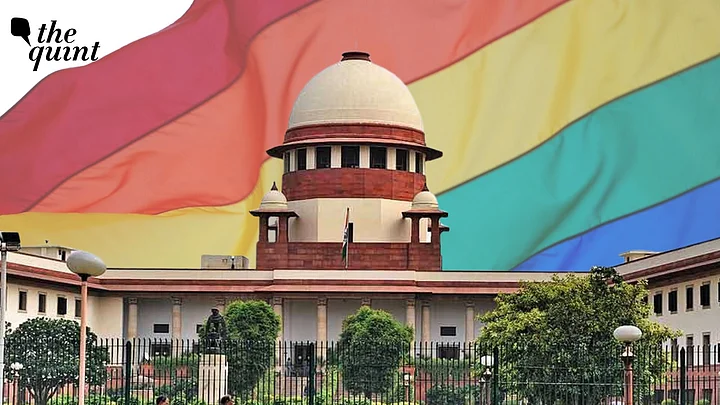The five-judge Constitution bench of the Supreme Court, headed by Chief Justice of India DY Chandrachud, continued hearing the marriage equality petitions on Wednesday, 26 April. Justice SK Kaul and Justice Ravindra Bhat, who were indisposed due to COVID, joined the bench virtually for the hearings.
Day 5 of the hearing saw the petitioners closing their arguments, and Solicitor General Tushar Mehta opening his submissions on behalf of the state. He once again urged the court to "leave the issue to the parliament."
As many as 20 petitions have been filed seeking marriage equality so far
At least 51 of the petitioners are queer people
The petitioners submitted that the right to marriage is not only a question of dignity but also ensures "a bouquet of rights" to queer people
'Don't Rely on Dobbs, It's a Wrong Judgment': CJI
To highlight judicial powers, Solicitor General Tushar Mehta relied on Dobbs v. Jackson Women's Health Organization in the United States – in which the US Supreme Court held that the constitution does not confer a right to abortion.
CJI Chandrachud, however, found fault with this, saying:
"These judgments on judicial power are well settled, but if you are relying on Dobbs v. Jackson Women's Health Organization to support this principle… then we have gone far ahead. In Dobbs, the US Supreme Court ruled that a woman has no autonomy over her bodily integrity... these are wrong judgments… we credit ourselves that we have gone far ahead than this, especially Dobbs."
'I Reiterate...Leave It To Parliament': SG Tushar Mehta
Opening his submissions for the state, Solicitor General Tushar Mehta once again urges the Supreme Court to leave the matter of marriage equality to the parliament and state legislatures.
"The lordships are dealing with a complex subject which has a social impact. Consider giving this to the parliament. There are several ramifications on other statues and society, which would need a debate in the society, in various state legislatures, civil society groups. At the outset, lordships can save the rest of the exercise and leave it to the parliament," he pleads.
What else did he argue?
The petitioners are seeking the right to get the socio-legal recognition of marriage. But what constitutes a marriage? Between whom? And who should take a call on this?
All laws so far define man and woman in a conventional sense. This debate is happening before lordships for the first time. Should it not go to the parliament or the state legislatures? Your lordships may not be in a position to consider a variety of situations... there will be a variety of problems only the parliament can take care of.
There is no value judgement or stigma attached in this case. Navtej gives the right of choice, privacy, autonomy, and sexual preference.
The right to marry does not include the right to compel the state to include a new definition of marriage. The parliament can do this; it's not an absolute right.
The moment any right is recognised, it is also regulated. There is no absolute right to marry even among heterosexual couples. Law prescribes when to marry and how many times one can marry [at the same time]. There are prohibited relationships; the law decides whom not to marry, and the law regulates the grounds of judicial separation. If the right to marriage is given to them, how will it be regulated?
We have definitions of LGBTQ+, but we have not tried to know what the '+' means. This is the core of the problem that the judiciary would face. There are 72 shades or variations. How will your lordships deal with these varieties of situation?
Even the prayers of the petitioners are extremely vague. Societal acceptance is needed for recognition of an union and this has to be through the parliament. And if it is done by the court, then it is detrimental to the LGBTQI, since you are forcing something against the will of the people. We cannot forget the historical background which led to the institution of marriage.
'Family Values Won't Get Affected': Jaideep Gupa
Senior Advocate Jaideep Gupta, appearing for intervenor Queer Collective of Indian Institute of Science, in his submissions, says:
"It is a misconception to say family values Indians cherish will be affected. It is because of these family values that they wish to get married. All values we cherish will come into effect."
'Idea of Innateness'
Advocate Shivam Singh argues about "idea of innateness" and says that "if something is so innate to a person, it is unconstitutional for the state to utilise that and discriminate against the person."
"...sexual orientation and gender are such innate characteristics of a person. To discriminate on the basis of this will fall foul of Article 14... The grant of positive rights over queer community is not a zero sum game.. the only argument that the Centre can present is that it runs against social morality," he adds.
